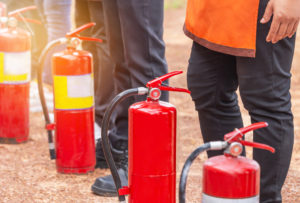1,040 New Jersey Workers Hospitalized Over 17 Year Period From Workplace Burns.
Burn injuries are some of the most painful and slowest to heal. Serious burns can cause scarring, disfigurement, and hindered mobility. Besides physical injury, burn victims suffer psychologically from trauma, physical disfigurement, and prolonged pain of recovery.
The U.S. Occupational Safety and Health Administration (OSHA) has specific regulations and procedures designed to prevent burn accidents in the workplace. And although it’s your employer’s job to comply with OSHA requirements, only you can ensure that you are educated and follow safe practices to prevent the occurrence of a workplace burn incident.
The four types of workplace burns and how to prevent them
Chemical Burns — Chemical burns happen when a strong acid, alkaloid, or other corrosive substance spills onto the skin or eyes, eating away at the skin and tissue. If you work in a laboratory, manufacturing plant, or handle industrial cleaners as part of your job, you may be at high risk for this type of injury.
If your job involves common exposure to hazardous materials, your employer is required by OSHA to have a written Hazard Communication plan. Your employer must also use color codes, posters, labels or signs to warn you of potential workplace hazards. You can best avoid chemical burns by:
- Reading labels and safety data sheet information for chemicals you are working with
- Wearing personal protective equipment if required
- Knowing where to locate your first aid, eye wash, and fire equipment
Thermal Burns — Thermal burns happen when the skin is scalded by hot liquids, such as oil, grease or water, or when the skin comes into contact with a hot surface or open flames. Personal protective equipment (PPE), such as goggles, respirators, or body protection can help prevent some types of thermal burn injuries.
Construction job sites are highly prone to fires, but this risk can be mitigated by adopting fire prevention tactics, such as:
- Not smoking at the job site
- Keeping job sites free of trash and debris
- Using flame retardant materials where possible
- Ensuring that electrical sources are properly maintained
Sun Exposure Burns — Although technically a subset of thermal burns, sun exposure burns require different safety practices than other types of thermal burns. Employees who work long hours in the sun should wear sun-protective work clothing, sunscreen, hats, and sunglasses to reduce the risk of burns.
Electrical Burns — Electrical burns happen when an electrical current passes through the body and damages internal tissue. To avoid this type of injury, you should:
- Wear appropriate personal protective equipment
- Follow Lock-Out/Tag-Out procedures
- Know the location of electrical sources in your workplace
- Avoid contact with water when working with electricity
Compensation for your workplace burn injury
In most states, including New Jersey, workers’ compensation generally prevents employees from recovering damages for their workplace burn injuries outside of the workers’ compensation scheme. However, with the average New Jersey employee receiving only $603 per claim in 2016, it is critical that injured workers well understand the claims process and its evidentiary requirements to get adequate compensation for their injuries.
If your burn injuries were caused by someone besides your employer, you may be able to file a third-party lawsuit. This may be the case if the machinery or equipment that you were injured by was defective or faulty or if your injury was caused by vendor or sub-contractor of your employer. Damages can include medical expenses, pain and suffering, time lost from work, and future earnings that are precluded by your injuries.
If you sustained a serious burn injury due to the negligence of another, contact me for a free consultation.

John E. Gregory, Jr. is a partner at Keefe Law Firm and a Vice President of the Trial Attorneys of New Jersey. He specializes in personal injury law.

